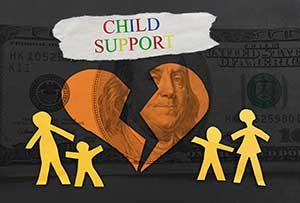
Rhode Island family law lawyer David Slepkow has represented clients in hundreds of Rhode Island child support cases. David Slepkow is an experienced Rhode Island child support lawyer. Child support is determined by a combination of case law and the RI child support guidelines.
How to calculate child support in Providence Family Court
In nearly all support cases in Rhode Island and Providence Plantations, the “Rhode Island Family Court Child Support Formula and Guidelines” are utilized by the Rhode Island Family Court Justice, Magistrate or General Magistrate. The minimum RI child support guideline amount is typically utilized to set child support.
Is there a minimum amount?
A father or mother who is under a support order in RI may seek greater than the minimum guidelines. The child support guidelines are just minimums. Theoretically, The support guidelines are intended to be the floor rather then the ceiling for child support in Providence Family Court. However, Rhode Island child support lawyers are well aware that the minimum guidelines are used in the vast majority of RI Support cases.
May a Providence Family court Justice review other factors to determine a support order for children?
The Kent County Family Court or Newport Family Court may review the real estate, property, accounts and other assets of both the payor and payee of support when setting child support. The Providence Family Court may consider extraordinary and unusual expenses of the custodial parent . the Court may review the needs and expenses of both the custodial and noncustodial parent. The Justice of the Family Court can look at any factors he or she deems appropriate. In some instances, the Providence Family Court magistrate may make a finding that a person is underemployed or not taking proper steps to obtain a job. In that case, the Justice can impute income to the parent subject to the support order.
What is the income shares model and how to calculate child support?
The RI Child Support guidelines utilize an income shares concept. The adjusted gross income of both the obligor and obligee parent of the minor child are looked at to determine the proper amount of child support. The child support guidelines in RI take into account the combined adjusted Gross income of both father and mother. Adjusted gross income is the gross income of a party subtracting certain required deductions for medical and dental insurance. Each party may subtract a certain amount for additional minor dependents (children) from their gross income. Discretionary deductions such as life insurance are rarely allowed in Providence Family Court
RI Support Guidelines
The RI Support Guidelines indicate what the state of RI determines the father and mother with that amount of adjusted gross income would pay for support if the parents were living with each other as a family. Daycare costs for reasonable and necessary work related daycare are factored into the child support amount. The non-custodial parent, pursuant to the minimum guidelines, should be obligated to pay a percentage of the amount, set forth above, that is the same percentage of that person’s adjusted gross income to the total adjusted gross income of both parties.
What could cause a Providence Family Court Judge to go over and above the minimums for support?
The factors that could lead a Washington County Family Court justice to go above the RI Child Support minimum guidelines are:
- High value assets
- Standard of living and expenses that far exceed reported gross income which may indicate that the person is misrepresenting his or her income to the Court
- Extraordinary and unusual necessary and reasonable expenses and needs of the children
Under RI child support law, can the parties agree to go below the child support guidelines?
Yes. If the parent’s consent, in writing or on the record, to child support below the RI Guidelines, it probably will be allowed.
Where do I find the RI child support guidelines and RI support worksheet?
2023 Rhode Island child support guidelines
RI law resources
“Moreover, the “Guidelines are intended to serve as a floor or base, and not as a ceiling or cap, in setting child support amounts.” Family Court Administrative Order 87-2, subsection (III). The guidelines encourage a Family Court justice to exercise broad discretion “in cases where application would be inequitable for either of the parties or to the child.” Id. “It is well established that the appropriate award of child support is to be determined by the trial justice in his or her sound discretion, and we shall not disturb such a determination on review absent a clear abuse of that discretion.” Mattera, 669 A.2d at 542. Because we conclude that the Family Court justice did not abuse his discretion, we affirm the award of child support.” 720 A.2d 230 (1998) Michael J. KOZIO v.Mary J. KOZIOL No. 97-511-Appeal. Supreme Court of Rhode Island. November 2, 1998. John E. McCann, Providence, for plaintiff. Jerry L. McIntyre, Providence, for defendant. Present WEISBERGER, C.J., LEDERBERG, BOURCIER, FLANDERS and GOLDBERG, JJ. OPINION LEDERBERG, Justice.
More Child Support articles here
